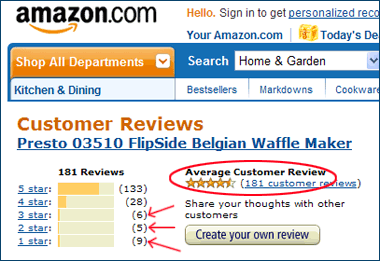Introduced by Amazon back in late nineties, reviews have become a powerful force to drive sales for online businesses of all types.
With the attention that online reviews have been receiving from the Federal Trade Commission lately, it seems appropriate to look into the power behind them. A recent CNN article has quoted some interesting data:
Consumers are becoming used to searching for reviews when they shop online. Internet shoppers rank reviews as the most desired feature of a Web site, according to a recent survey by Forrester Research.
It’s important that site owners resist the temptation to edit or delete reviews they don’t like. “If everything is positive, that raises a red flag among consumers,” says Forrester’s Anderson…
And even negative reviews can be beneficial…[underlining mine]
CNN also quotes AlpacaDirect.com’s experience when even with mediocre reviews on site (e.g. one of their golf cardigans was reviewed as being “kinda sweaty” and a “poor fit”) the sales were observed to raise 23%. Yes, consumers are looking for honest reviews by real people. They do want to know about the shortcomings of the products before they buy. There is no 100% perfect product/service out there, and e-tailers that clearly realize this, only benefit by adding a reviews functionality to their website.
Let’s look at an interesting example. At the time of this post, the #1 bestseller in Amazon.com’s Home & Garden section is a waffle maker by Presto. This product currently has 181 customer reviews averaging 4.5 stars. Some of these reviews rank the product as low as 1 or 2 stars:

Does it mean it’s a bad, unwanted product? On the contrary! For over half a year, it has been in the section’s Top 100 products, and now it’s an absolute bestseller:

Back in 2007 Sam Decker quoted an eVoc Insights study which reported that 48% of “consumers need to consult reviews before making an online purchase”, and many of them expect to see negative reviews alongside with positive ones — “to make sure they can live with any shortcomings in products they buy” [more here].
Observations show that by helping e-tailers see where the real problems are, negative reviews help us improve based on the feedback received. Listening, being honest, staying calm, speaking like a real person, and promising to be better are recommended by Lisa Barone as the ways to handle negative reviews in a constructive way — one that establishes the real credibility and trust.
Geno, EXCELLENT post my friend.
Blogging about it now on our blog.
Glad you’ve enjoyed it, Matt, and happy to see that it inspired you to put together yours. WTG, and see you in California in a week!
Pingback: The New York Times Ignores ‘Atlas Shrugged’ | rebelpundit